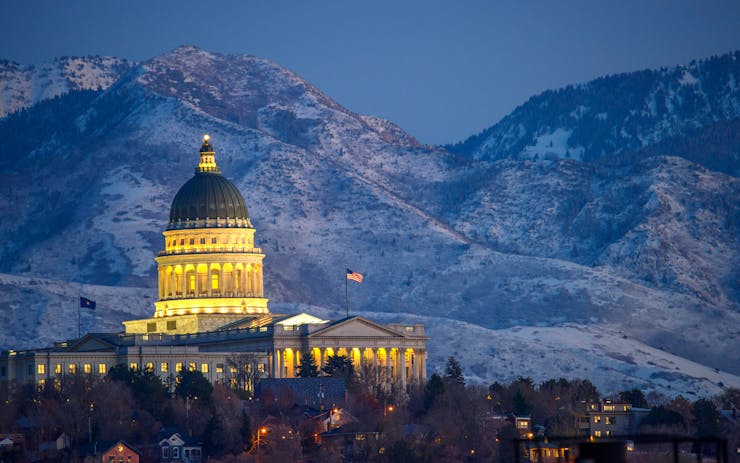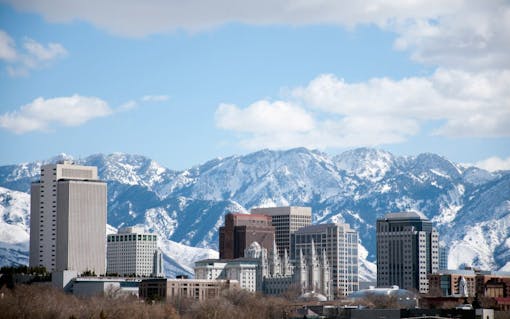On the morning of Oct. 4, a number of Utah politicians, religious leaders, medical patients, and representatives from the Libertas Institute, a libertarian think tank, gathered before a packed audience in the Utah State Capitol’s ornate gold room. The group had gathered to announce a deal: In the coming months, they said, state lawmakers would introduce a bill to legalize medical cannabis—regardless of whether state voters pass the medical marijuana bill, Proposition 2, on November’s ballot.
Though Proposition 2 would create one of the country’s more restrictive medical marijuana, it’s drawn scorn—and organized opposition—from the state’s political establishment, which is dominated by the Church of Jesus Christ of Latter-day Saints (LDS). The church’s pushback made a big dent in what polls suggested was a comfortable lead for legalization, but a thin majority of Utahns still back the measure.
No matter how it works out, Utah’s compromise is the latest evidence of how quickly confidence in medical marijuana’s value has reached some of America’s most conservative communities. The question now is whether it can succeed or whether, as some critics worry, the compromise was designed to fail from the start.
The Grand Bargain
While details will be debated by the Legislature, the compromise’s proposed bill would allow a total of five privately operated dispensaries in the state and one publicly controlled one. (Prop. 2, by contrast, would allow one dispensary per 150,000 residents, or about eight dispensaries in Salt Lake City alone.) It would also ban home growing—which is allowed under Prop. 2—and add a raft of other restrictions. Utah dispensaries would be known as “medical cannabis pharmacies.”
“If Proposition 2 were to fail, we'd still want to move forward with a model to provide medical cannabis to patients who need it.”
No doubt the compromise was easier to reach because virtually everyone agrees Utah is nowhere close to legalizing for recreational use. “This campaign was never about notching up another election victory,” Marijuana Policy Project deputy director Matthew Schweich said in a statement. “Our goal was simply to help medical cannabis patients in Utah who are being treated like criminals as they seek to alleviate their suffering.”
At the Oct. 4 press conference, Republican Gov. Gary Herbert, who opposes Prop. 2, seemed to agree. All the assembled stakeholders shared a common interest, he said, in alleviating pain and suffering. They also want to ensure that only individuals with a pressing medical need can access cannabis in Utah. This is more or less the Mormon church’s official view: It’s increasingly OK with doctor-approved medical use, but it still frowns on recreational use.
On both sides, Prop. 2 had attracted what Utahns considered dirty political tactics. The announcement of a deal between advocates and opponents was touted as a chance to put aside differences and act in the common interest. In Utah, compromise remains a cherished value.
Since the compromise was struck, however, questions have arisen about whether it can hold. Advocates on each side consider it inadequate, and even some who are party to the bargain continue to advocate for passing or rejecting Prop. 2, convinced the result will influence the final deal.
A Compassion Conundrum
On the way into Salt Lake City from the airport, a roadside billboard quotes Mormon scripture to support Prop. 2. “All wholesome herbs,” it says, “God hath ordained for the use of man.”
Downtown Salt Lake is clean and prosperous. A few blocks feel almost hip, dotted with pleasant shops, cafes, and performing arts spaces. Religious Mormons don’t ingest alcohol or caffeine, but it’s not hard to find a cocktail (though bartenders can’t pour doubles) and coffeeshops, both independent are corporate, are everywhere.
Shop highly rated dispensaries near you
Showing you dispensaries nearSituated in a valley below the Wasatch range, the city attracts its share of outdoorsy professionals. Mayor Jackie Biskupski, is a Democrat and a lesbian, who grew up in Minnesota with Catholic parents. (In Utah, lineage matters, and Biskupski’s non-Mormon background likely helped her with some voters in the relatively liberal city.) The city has developed a reputation for progressivism on LGBTQ issues, though the church doesn’t share those views.
Still, it’s easy to see who’s in charge. The church’s temple complex dominates downtown with its array of bland-yet-imposing office buildings, meeting halls, and visitor centers. The temple itself is an off-white, gothic-inspired structure which non-Mormons cannot enter. Across the street, an upscale mall—think Tiffany & Co., Anthropologie, etc.—joins the age-old tradition of gouging pilgrims.
Medical marijuana supporters in Utah have garnered support for the issue by framing it as an issue of compassion, said Chase Thomas, executive director of the small progressive group Alliance for a Better Utah, which is based in a startup space downtown. The legalization movement has cannily spotlighted the ordeals of patients, some of whom in dire circumstances, who say they may have to leave the state just to access medical cannabis.
“Everyone knows someone who’s had cancer,” said the group’s communications director, Katie Matheson. Pro-cannabis activists have promoted it as an issue for families—a smart approach in Utah, Matheson added. Both she and Thomas were raised in LDS families and have developed a sense of what will fly among state voters and what won’t.
On top of the opioid crisis—Utah has one of the highest drug-overdose rates among Western states—families here are confronting an unsettling mix of other problems, including a high suicide rate, and the prevalence of ADHD, which can lead to anxiety. The issues have rattled the state and, in many ways, have opened the door for voters to consider other avenues.
“Parents are afraid,” Matheson said. “There’s a heightened sense of need to care for and protect your children. So when you see a child who is suffering from something, even if it’s not your child, [families are] circling the wagons—a very Utah phrase—to care for our children in any way we can.”
The response comes despite the fact medical marijuana is not a proven treatment for either ADHD or suicidal ideation. It’s an issue, Thomas said, that has been a source of pushback against legalization, in addition to opponents’ claims that legal access to cannabis could foment more serious public health crises.
Legalizing access to medical marijuana still has majority support in the state, but support for Prop. 2 has fallen sharply in recent months, losing roughly 15 percentage points since June. Survey results from early October showed 51% support.
“Obedience to authority is valued,” in the Mormon church, Matheson said. “So to watch a lot of people who are faithful LDS members speak up in support of Proposition 2, even after the LDS church has spoken against it, was really interesting.”
‘Designed to Fail’?
Some are skeptical of the state’s shiny new deal. Certain cannabis activists see the compromise as a way for the church to hobble a state medical marijuana program by making access as difficult as possible. Christine Stenquist, who founded the advocacy group Together for Responsible Use and Cannabis Education (TRUCE), declined to join the deal.
“I don’t think it’s a compromise,” she said. “I don’t like the bill. I don’t think it’s patient-centric. I think it was created in fear and is designed to fail”
Lawmakers supporting the deal deny that charge. “”This is not to interrupt [Proposition 2]. This is to acknowledge it,” state House Speaker Greg Hughes told lawmakers at an Oct. 23 public forum in the Senate Office Building, according to the Associated Press. “If Proposition 2 were to fail, we’d still want to move forward with a model to provide medical cannabis to patients who need it,” he said. But many legalization advocates are still skeptical.
Stenquist has deep roots in Utah as part of the Marriott clan, an LDS family that started the namesake hotel chain. She came to cannabis after suffering a slew of serious health problems as a young mother, which forced her onto public assistance and a cocktail of pharmaceuticals. She described it as a “life of non-existence” until she discovered cannabis and saw a rapid improvement.
Ultimately Stenquist sees the compromise as running counter to patient interests, designed instead to help the church maintain its vision of social order. As a precedent, she cited a 2015 compromise designed to extend employment and housing antidiscrimination protections to LGBTQ Utahns from discrimination but also ensure LDS members did not have to violate their religious principles by, for example, performing same-sex weddings. Liberals have attacked Utah’s LGBTQ compromise as insufficient and riddled with carveouts and exemptions.
“[The church] makes these compromises,” then ensures they don’t work, she said. “That’s the reality of living in Utah.”





